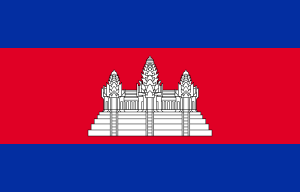Language/Central-khmer/Grammar/Pronouns
Hi Central Khmer learners! 😊
In this lesson, we will learn about Central Khmer pronouns, which are words that replace nouns. They help us avoid repetition and make sentences sound more natural. Pronouns are used in daily conversation, writing, and formal speeches. They are essential in any language for fluent communication.
Don't miss the chance to check out these pages as you wrap up this lesson: Describing Actions and States & How to Use Be.
Personal Pronouns[edit | edit source]
Personal pronouns in Central Khmer do not change based on gender but may vary with the level of formality and social hierarchy. Here's a corrected table of personal pronouns:
| Central Khmer | Pronunciation | English |
|---|---|---|
| ខ្ញុំ | khnhom | I/me |
| អ្នក | neak | you (singular/formal) |
| គាត់ | keat | he/she/it (formal) |
| យើង | yeung | we/us |
| ពួកយើង | puok yeung | you (plural) |
| ពួកគាត់ | puok keat | they/them |
Possessive Pronouns[edit | edit source]
Possessive pronouns in Khmer follow the structure of personal pronouns with the addition of "របស់" (robos) to denote possession. Here's a corrected version:
| Central Khmer | Pronunciation | English |
|---|---|---|
| របស់ខ្ញុំ | robos khnhom | my/mine |
| របស់អ្នក | robos neak | your(s) |
| របស់គាត់ | robos keat | his/hers/its |
| របស់យើង | robos yeung | our(s) |
| របស់ពួកយើង | robos puok yeung | your(s) (plural) |
| របស់ពួកគាត់ | robos puok keat | their(s) |
Reflexive Pronouns[edit | edit source]
Reflexive pronouns in Central Khmer are formed by adding "ខ្លួន" (kloun) to the respective personal pronoun, not "ឯង (eang)" as previously stated. Here's the corrected version:
| Central Khmer | Pronunciation | English |
|---|---|---|
| ខ្ញុំខ្លួន | khnhom kloun | myself |
| អ្នកខ្លួន | neak kloun | yourself |
| គាត់ខ្លួន | keat kloun | himself/herself/itself |
| យើងខ្លួន | yeung kloun | ourselves |
| ពួកយើងខ្លួន | puok yeung kloun | yourselves (plural) |
| ពួកគាត់ខ្លួន | puok keat kloun | themselves |
Demonstrative Pronouns[edit | edit source]
Demonstrative pronouns are correctly noted in the original lesson, but here's a slight clarification for better understanding:
| Central Khmer | Pronunciation | English |
|---|---|---|
| នេះ | nih | this/these |
| នោះ | noh | that/those |
Indefinite Pronouns[edit | edit source]
The lesson on indefinite pronouns was somewhat misleading. Here's a simplified and corrected table:
| Central Khmer | Pronunciation | English |
|---|---|---|
| មនុស្សម្នាក ់ណាមួយ | monus menak na mouy | someone |
| អ្វីមួយ | avei mouy | something |
| គ្រប់គ្នា | krob knie | everyone/everything |
Interrogative Pronouns[edit | edit source]
Interrogative pronouns in Central Khmer include words for asking about people, things, places, and reasons. Here's a corrected and expanded list:
| Central Khmer | Pronunciation | English |
|---|---|---|
| អ្វី | avei | What? |
| នរណា | nor na | Who? |
| តើ | tae | (used for forming questions, not a standalone pronoun) |
| ហេតុអ្វី | het avei | Why? |
To improve your Central Khmer Grammar, you can also use the Polyglot Club website. Find native speakers and ask them any questions!
Sources[edit | edit source]
Other Lessons[edit | edit source]
- How to Use Be
- Gender
- Adjectives
- Plurals
- Negation
- How to Use Have
- Questions
- Give your Opinion
- Conditional Mood


